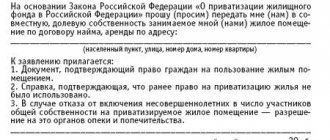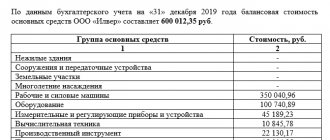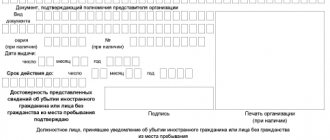Documents for guardianship authorities
- home
- Documentation
- Documents for guardianship authorities
List of documents required to obtain permission from the guardianship and trusteeship authorities for an apartment purchase and sale transaction
In fact, this list of documents is required not only for purchase and sale, but also for exchange, donation, determination of shares, rent, etc., where minor children are the owners.
- Application from the parents of the minor, and in their absence - a document confirming this fact (death certificate, court decision on deprivation of parental rights, court decision recognizing the parent as missing, etc.). The personal presence of both parents in the guardianship and trusteeship department is required!
- Statement from a minor participating in the transaction who has reached the age of 14.
- Child's birth certificate, parents' passports.
- Documents confirming ownership of all residential premises involved in the transaction.
- BTI certificates on the estimated value of all residential premises involved in the transaction.
- Explication and floor plan (cadastral plan) for all residential premises involved in the transaction.
- Extracts from house books for all residential premises participating in the transaction (originals only), copies of financial personal accounts for all residential premises participating in the transaction (originals only) or the Unified Housing Document (UZhD)
- Certificates of debt from the EIRC for all residential premises involved in the transaction (optional).
Applications must be dated and signed in the presence of a specialist from the guardianship and trusteeship department. NOTES:
the Department of Guardianship and Trusteeship accepts applications from citizens only if they provide a complete package of documents for all residential areas involved in the transaction;
The originals of all documents along with their copies are submitted to the guardianship and trusteeship department;
The deadline for preparing administrative documents is one month from the date of writing the applications, while the following are not taken into account as valid reasons for speeding up the preparation of orders:
- expiring deadlines for documents submitted for consideration,
- expiring deadlines for making deposits, deposits for apartments,
- any oral or written agreements between the parties, notaries, companies, etc.
All documents submitted for consideration to the guardianship and trusteeship department must not have expired issuance dates. Changes and additions may be made to the specified list of documents depending on the nature of the transaction.
Sample parental statement
Note: if children are not the owners of the apartment, then permission from the guardianship and trusteeship authorities for a real estate transaction is not required. The exception is cases where the rights of minors were violated during the privatization of an apartment.
The article is devoted to the peculiarities of notary certification of transactions related to the disposal of real estate under guardianship conditions, as well as transactions for the alienation of real estate belonging to a minor citizen. The basic requirements that are established by current legislation and aimed at protecting the property rights of persons who do not have full civil capacity, as well as problems associated with their interpretation and application, including examples of judicial practice, are considered. Features of legal regulation are considered from the standpoint of the presence of public principles in it and the performance of a human rights function by a notary.
Mandatory involvement in the notarial sphere of transactions with special subjects, in particular with persons with incomplete civil legal capacity, is due to the need to introduce public control by the notary in order to protect the rights of such persons as the weakest party in the transaction. At the same time, the vulnerability of the legal status of these subjects lies in the fact that in such situations, actions are performed in relative contradiction with one of the most important principles of civil law - the principle of dispositivity. According to paragraph 2 of Art. 1 of the Civil Code of the Russian Federation, citizens (individuals) and legal entities acquire and exercise their civil rights of their own will and in their own interest. “By acting of their own will, citizens and legal entities exercise their ability to direct their actions to achieve certain legal goals. The legislator attaches legal significance to the will of a person for the emergence of legal consequences: defects in the formation and expression of the will of a person can serve as a basis for recognizing the invalidity of transactions... The will is formed on the basis of the interest of the person. As a rule, participants in civil legal relations act in their own interests, thereby satisfying their needs” <3>. The lack of full legal capacity of a person as a participant in civil transactions entails the need to fill it with the actions of other entities. Involving third parties in the sphere of property interests is fraught with abuse on their part, which may negatively affect the rights and interests of persons who are not fully capable.
Of course, the institution of preliminary permission from the guardianship and trusteeship authorities served and continues to serve the purpose of protecting and defending the rights of persons who are not fully capable when their missing legal capacity is filled by the actions of other persons (Clause 2 of Article 37 of the Civil Code of the Russian Federation). Such permission is requested and granted for the purpose of monitoring the actions of representatives of persons who are not fully capable and is a public legal manifestation in the regulation of this segment of civil legal relations. The introduction, in addition to this method of protection, of a mandatory notarial form of administrative transactions with the property of wards indicates the strengthening of public principles in the regulation of these relations. “The principle of publicity in the activities of a notary and his human rights function are closely interrelated. By protecting the rights and legitimate interests of citizens and legal entities, the notary thereby realizes the public interest, manifested in the creation of favorable conditions for economic activity and civil circulation, for a stable life” <4>. The public nature of notarial activity has also been repeatedly indicated and is indicated in the decisions of the Constitutional Court of the Russian Federation <5> (hereinafter referred to as the Constitutional Court of the Russian Federation). In accordance with paragraph 1 of Art. 163 of the Civil Code of the Russian Federation, notarization of a transaction means checking the legality of the transaction, including whether each party has the right to complete it, and is carried out by a notary or an official who has the right to perform such a notarial act, in the manner established by the law on notaries and notarial activities. We believe that the direct indication in Art. 163 of the Civil Code of the Russian Federation on the need to comply with the rules on notaries and notarial activities when certifying a transaction connects private law and public law principles present in regulating the form of the transaction.
Despite the fact that in Art. 163 of the Civil Code of the Russian Federation, verification of legality is revealed only by indicating a separate case of verification of a person’s rights to complete a transaction; when certifying a transaction with property or with the participation of a minor, the need to protect the rights of minors and persons under guardianship comes first. So, in accordance with Art. 1 of the Fundamentals of the legislation of the Russian Federation on notaries, the task of a notary is to protect the rights of citizens and legal entities by performing notarial acts by a notary. The current Russian legislation contains a whole block of rules aimed at creating different levels of protection of the rights of minors and persons under guardianship, as the most vulnerable participants in civil circulation.
The foregoing does not detract from the fact that the notary, when certifying the transactions in question, is obliged to check compliance with the requirements within the framework of the current special legal regime for real estate, including in the public interest. Such requirements include rules on the written form of a transaction by drawing up a single document (Articles 160, 434 of the Civil Code of the Russian Federation), on state registration of rights to real estate arising or terminated on its basis, and other requirements provided for by current legislation for certain types transactions.
However, within the framework of this article, I would like to dwell on the features of certifying a transaction for the alienation of property of minors and persons under guardianship, in relation to their special legal status. Thus, when notarizing a transaction, the notary must first of all focus his attention on compliance with the following rules:
firstly, the general civil protective requirements enshrined in the first part of the Civil Code of the Russian Federation (Article 37 of the Civil Code of the Russian Federation);
secondly, special rules aimed at developing the general rules of Art. 37 of the Civil Code of the Russian Federation (Article 21 of the Federal Law of April 24, 2008 N 48-FZ “On Guardianship and Trusteeship” <6> (hereinafter referred to as the Guardianship Law));
thirdly, special rules establishing the grounds and procedure for making alienation transactions with the real estate of wards (Article 20 of the Law on Guardianship).
In accordance with paragraph 2 of Art. 37 of the Civil Code of the Russian Federation, the guardian does not have the right, without the prior permission of the guardianship and trusteeship body, to carry out, and the trustee does not have the right to consent to, transactions for the alienation, including the exchange or donation of the ward’s property, leasing it (lease), for free use or as a pledge, transactions entailing the renunciation of the rights belonging to the ward, the division of his property or the allocation of shares from it, as well as any other actions entailing a decrease in the property of the ward.
Despite the fact that this article uses the terms “guardian” and “trustee”, it fully extends its effect to the exercise by parents of their powers as legal representatives of children, which is confirmed by the position of the Constitutional Court of the Russian Federation. Thus, in the Determination of September 24, 2013 N 1280-O “On the refusal to accept for consideration the complaint of citizen Taisiya Aleksandrovna Zubova about the violation of her constitutional rights, paragraph 2 of Art. 37 and Art. 250 of the Civil Code of the Russian Federation” of the Constitutional Court of the Russian Federation, analyzing paragraph 2 of Art. 37 of the Civil Code of the Russian Federation, aimed at protecting the property rights of wards, concludes that it is necessary to extend to the exercise by parents the powers to manage the child’s property and to the protection of the property rights of minor children by virtue of paragraph. 3 p. 3 art. 60 of the RF IC rules regarding the disposal of the property of a ward. “The above means that all the restrictions that are established for transactions with the property of a ward also apply to the property of children who have not lost parental care.”
In accordance with paragraph. 1 clause 1 art. 28 of the Civil Code of the Russian Federation, the above rules apply to the actions of legal representatives of minors aged 0 to 14 years, as well as to the actions of legal representatives of minors aged 14 to 18 years. Despite the absence of a direct reference in Art. 26 of the Civil Code of the Russian Federation to Art. 37 of the Civil Code of the Russian Federation, this interpretation follows from the systematic application of the provisions of Art. Art. 26, 37 of the Civil Code of the Russian Federation, as well as Art. 60 of the RF IC, which is confirmed by judicial practice <8>.
The essence of the provisions of paragraph 2 of Art. 37 of the Civil Code of the Russian Federation is that when committing any actions that may lead to derogation of the property of a ward, it is necessary to obtain prior permission from the guardianship and trusteeship authority. By its legal nature, this permission refers to a type of consent to carry out a transaction provided for in paragraph 3 of Art. 157.1 of the Civil Code of the Russian Federation, which has the nature of a general norm. At the same time, special rules on the grounds and procedure for granting preliminary permission are concentrated in Art. 21 of the Guardianship Law. As can be concluded from the literal interpretation of these provisions, as well as from the nature of the relations regulated by them, we are talking exclusively about such a type of consent as preliminary consent (paragraph 2, paragraph 3, article 157.1 of the Civil Code of the Russian Federation), which is confirmed by judicial practice
Particularly noteworthy is the enshrinement in current legislation of the legal consequences of completing a transaction without the prior permission of the guardianship and trusteeship authority. Until the Guardianship Law came into force on September 1, 2008, transactions in the absence of prior permission from the guardianship and trusteeship authority clearly entailed their nullity (as concluded in violation of the requirements of Article 37 of the Civil Code of the Russian Federation in joint application with Article 168 of the Civil Code of the Russian Federation in the previous editors).
According to paragraph 1 of Art. 168 of the Civil Code of the Russian Federation in the current version, with the exception of cases provided for in paragraph 2 of this article or other law, a transaction that violates the requirements of the law or other legal act is voidable, unless it follows from the law that other consequences of the violation not related to invalidity of the transaction. Another consequence of violating the requirements of the law is the consequence established in paragraph 4 of Art. 21 of the Law on Guardianship, however, not in relation to all transactions and other actions, but only to contracts. The need to apply precisely this consequence when making a transaction with such a type of real estate of a minor as a residential premises is expressly stated in Art. 20 of the Guardianship Law. So, in paragraph 3 of Art. 20 of the Law on Guardianship it is established that if it is discovered that the ward’s residential premises have been alienated without prior permission from the guardianship and trusteeship authority, the rules of Part 4 of Art. 21 of the Guardianship Law.
According to paragraph 4 of Art. 21 of the Law on Guardianship, upon discovering the fact of concluding an agreement on behalf of the ward without the prior permission of the guardianship and trusteeship authority, the latter is obliged to immediately apply on behalf of the ward to the court with a demand for termination of such an agreement in accordance with civil law, except for cases where such an agreement was concluded for the benefit of ward. Thus, this rule represents another consequence of violating the requirement of the Law to obtain prior permission, not related to the invalidity of the contract. “It seems that such a legislative decision is extremely unfortunate, to say the least, harmful for the wards, whose property rights in this situation may be violated”
At the same time, an analysis of the judicial practice of courts of general jurisdiction demonstrates that for this reason or due to inertia, a transaction completed in the absence of prior permission from the guardianship and trusteeship authority, when required by law, continues to be recognized by the courts as a void transaction with reference to Art. 37 Civil Code of the Russian Federation. In our opinion, this is more consistent with the nature of the violation, since there is an encroachment on both public interests and the rights of third parties. Although formally the law directly requires the occurrence of other legal consequences.
At the same time, in the last two or three years, other judicial practice has appeared, which is still of an episodic nature. Thus, in the Appeal ruling of the Moscow Regional Court in case No. 33-11380/2014 the following is stated: “... the judicial panel also considers it necessary to point out that even if we evaluate the disputed agreement as concluded not in full with the permission provided by the guardianship authorities, then in By virtue of a direct indication in the law, this does not lead to its invalidity. In accordance with Part 4 of Art. 21 of the Federal Law “On Guardianship and Trusteeship”, upon discovering the fact of concluding an agreement on behalf of the ward without the prior permission of the guardianship and trusteeship authority, the latter is obliged to immediately apply on behalf of the ward to the court with a demand for termination of such an agreement in accordance with civil law, except if such the contract is concluded for the benefit of the ward. Thus, the court had no grounds for declaring the purchase and sale agreement invalid and applying the consequences of invalidity of the transaction” <11>. A rather interesting conclusion about the legal consequences was made in the Appeal ruling of the Moscow City Court dated September 12, 2014 No. 33-19861: “The consequence of completing a transaction (in this case, concluding a loan agreement) without the prior permission of the guardianship and trusteeship authority is the termination of such an agreement at the request of the authority guardianship and trusteeship in the manner provided for in Part 4 of Art. 21 of the Law (except for the case if such an agreement is concluded for the benefit of the ward), or the application of the consequences of a void transaction (Articles 166 - 168 of the Civil Code of the Russian Federation)"
The differences in the grounds and consequences of declaring a contract invalid and terminating it should be obvious to any lawyer. In this regard, allowing such uncertainty in law enforcement is, of course, absolutely unacceptable. It seems that leaving such a situation without clarification on the part of the legislator is fraught with legal instability. This creates serious problems for notarial practice; Notaries face a dilemma related to the possibility of performing a notarial act and certifying an agreement in the absence of prior permission from the guardianship and trusteeship authority.
Another prohibition, compliance with which must be verified when notarizing a transaction, is the prohibition established in paragraph 3 of Art. 37 Civil Code of the Russian Federation. According to this norm, the guardian, trustee, their spouses and close relatives do not have the right to enter into transactions with the ward, with the exception of transferring property to the ward as a gift or for free use, as well as to represent the ward when concluding transactions or conducting legal cases between the ward and the spouse of the guardian or trustee and their close relatives.
In notarial practice, checking compliance with this rule is very important. This ban is a ban on certain types of transactions due to a special subject composition. It should be noted that it is formulated as a universal rule designed to carry out any (aimed at both the alienation and acquisition of property) transactions by the legal representative of a minor on his behalf with his close relatives or spouse <14>. For example, in one of the clarifications, the Ministry of Economic Development writes the following: “Current legislation establishes a ban on transactions between minors and close relatives of their legal representatives, with the exception of the transfer of property as a gift or for free use, regardless of whether the property of minors is alienated or not.”
At the same time, recently an increasing number of examples of judicial practice have appeared, which explain that the rule of paragraph 3 of Art. 37 of the Civil Code of the Russian Federation should be applied in conjunction with the rule of paragraph 2 of this article <16>. The above means that if the transaction is aimed at increasing the property scope of a minor child, then the prohibition in question does not apply, and it is included only if the transaction is related to the disposal of property belonging to the ward, i.e. entails derogation of his property. Thus, one of the court decisions states the following: “Within the meaning of Article 37 of the Civil Code of the Russian Federation, which regulates the conditions for disposing of the property of a ward, this legal norm suppresses any possibility of violation of the property rights of minors by the guardian (trustee) and his close relatives. This rule of substantive law does not allow parents of minors to alienate their children’s property for their own benefit, and also does not allow for the alienation of a minor’s property for the benefit of a guardian or other person interested in the outcome of the transaction. In this case, the transaction was concluded by the parents of minors in the interests of their children, who, under the terms of the agreement, acquire shares in a real estate property - residential premises, therefore, the housing rights and interests of minors are not infringed.” An essentially similar position was expressed in another court decision: “Resolving the dispute on the merits and satisfying the plaintiff’s demands, the court of first instance reasonably came to the conclusion that this transaction was not made with the property of minors, but with residential premises that did not belong to them, that is, the transaction is aimed at acquiring residential property for minors.”
Despite different positions on the interpretation of paragraph 3 of Art. 37 of the Civil Code of the Russian Federation, given above, then, when the transaction is aimed at reducing the property of the ward, undoubtedly, the prohibition established in paragraph 3 of Art. 37 Civil Code of the Russian Federation. Thus, when making alienation (disposition) transactions with the property of minors and persons under guardianship, the notary is obliged to make sure that this prohibition is not violated. Otherwise, a transaction that has a corresponding defect is recognized by force of law as void as violating the rights of third parties and public interests (Clause 2 of Article 168 of the Civil Code of the Russian Federation).
If the provisions of Art. 37 Civil Code of the Russian Federation and Art. 21 of the Law on Guardianship are very well “familiar” to notarial practice, they actually found themselves “aside” from the attention of the notarial community, the rules established in Art. 20 of the Guardianship Law. Thus, this norm contains, as a general rule, a ban on the alienation of real estate of wards. But this rule has exceptions, the list of which is set out in paragraph 1 of this article. Real estate owned by a ward is not subject to alienation, with the exception of:
1) forced foreclosure on the grounds and in the manner established by federal law, including when foreclosure on the subject of pledge;
2) alienation under an annuity agreement, if such an agreement is made for the benefit of the ward;
3) alienation under a barter agreement, if such an agreement is made for the benefit of the ward;
4) alienation of residential premises belonging to the ward when the ward changes his place of residence;
5) alienation of real estate in exceptional cases (the need to pay for expensive treatment, etc.), if the interests of the ward require it.
Establishing the specified restrictions on transactions for the alienation of the property of a ward should be the main concern of the notary when checking the contents of the transaction. This is due to the fact that violation of the requirements of paragraph 1 of Art. 20 of the Law on Guardianship, established specifically to protect the property rights of wards, will entail the nullity of the transaction in accordance with paragraph 2 of Art. 168 Civil Code of the Russian Federation. At the same time, the presence of prior permission from the guardianship and trusteeship authority to carry out such a transaction cannot in itself presume the legality of its content in this part or lead to its validation.
It seems that all the above-discussed features of transactions with the property of minors and persons under guardianship also apply to transactions that are concluded with shares in the right to real estate owned by these entities, especially since transactions with shares are now also subject to mandatory notarial certificate. This conclusion is confirmed by judicial practice. Thus, in the information letter of the Presidium of the Supreme Arbitration Court of the Russian Federation dated January 28, 2005 No. 90 “Review of the practice of consideration by arbitration courts of disputes related to a mortgage agreement” the following is explained: “Clause 1 of Article 130 of the Civil Code of the Russian Federation classifies only immovable things as real estate. According to paragraph 1 of Article 131, ownership of real estate is subject to state registration. Therefore, the common shared ownership of several persons in an immovable property is subject to state registration. Also, in accordance with the rules of part two of Article 251 and paragraph 2 of Article 223 of the Civil Code of the Russian Federation, the transfer of the right to a share in the ownership of real estate is subject to state registration. Since the emergence of common shared ownership of real estate and the transfer of shares in the ownership of real estate are subject to state registration, the rules on real estate transactions apply to transactions with shares in the ownership of real estate.”
To conclude our consideration of the features of certifying contracts aimed at the disposal of real estate under guardianship conditions, as well as the alienation of real estate of minors, we will dwell on the features of consolidating this rule. In our opinion, there are at least two such features.
The first one, I think, surprised many. This is the placement of a rule on the form of transactions in a normative act of a procedural nature, the subject of which does not include rules on the establishment of such rules. As follows from the name of the Law (“On registration of rights to real estate and transactions with it”), its main purpose is to establish the procedure for state registration of rights to real estate and transactions with it. At the same time, this Law was adopted in pursuance of the rules established by Art. 131 Civil Code of the Russian Federation. So, according to paragraph 2 of Art. 2 of the Federal Law “On Registration of Rights to Real Estate and Transactions Therewith”, state registration of rights is carried out throughout the Russian Federation according to the system of records of rights to each object of real estate established by this Federal Law in the Unified State Register of Rights to Real Estate and Transactions with It (hereinafter referred to as the Unified State Register of Rights).
Also in paragraph 1 of Art. 1 of the Law on Real Estate Registration, where today the rule in question has been consolidated, it is established that this Law regulates relations arising in connection with the implementation on the territory of the Russian Federation of state registration of rights to real estate and transactions with it, subject to state registration in accordance with the legislation of the Russian Federation , state cadastral registration of real estate subject to such registration in accordance with this Federal Law, as well as maintaining the Unified State Register of Real Estate and providing the information provided for by this Federal Law contained in the Unified State Register of Real Estate.
It is indisputable that the rules on the form of a transaction fall under the jurisdiction of civil legislation, which is a set of normative acts of substantive law. It should be recognized as justified and correct proposals made earlier in the literature about the need to amend civil legislation (Articles 161, 163 of the Civil Code of the Russian Federation), providing for mandatory notarization of transactions aimed at the alienation of property with the participation of a minor. It seems more logical and correct to place such norms in the Civil Code of the Russian Federation. The existing regulation, of course, will not complicate their application, but, unfortunately, it does not indicate a high general legal culture and level of legal technology.
The second feature is that the very wording of the rules contained in Part 2 of Art. 54 of the Law on Real Estate Registration. According to this norm, transactions related to the disposal of real estate under guardianship conditions, as well as transactions for the alienation of real estate belonging to a minor citizen or a citizen recognized as having limited legal capacity, are subject to notarization.
The expression “disposal of real estate under the terms of guardianship,” in our opinion, is extremely incorrect, since guardianship is a form of representation and (or) education established to protect the rights of a subject who does not have full legal capacity; These include minors under the age of 14, as well as adults recognized by the court as incompetent. Therefore, there can be no transaction or action to order under the terms of guardianship. It would be even more strange to assume that the phrase “under guardianship” refers to real estate, since such a formulation is completely meaningless. Thus, guardianship is not and cannot be a condition for the subject to perform administrative actions. We believe that the essence of this rule is that a transaction for the disposal of real estate belonging to a person under guardianship is subject to notarization.
If we proceed from this statement, then any transactions for the disposal of real estate of a person under guardianship must be concluded in notarial form. The term “disposal” is a broader concept compared to the term “alienation”; the latter is a special case of disposition. But, among other things, this should include the transfer of property for use, the transfer of property as collateral, and the division of property, since disposal as the power of the owner means determining the legal fate of the property.
In this case, from Part 2 of Art. 54 of the Law on Real Estate Registration the following must be followed: if a person is declared incompetent and is therefore under guardianship, or a child has not reached the age of 14 and has lost parental care, and therefore is also placed under guardianship, then any transactions for the disposal of their property must be completed in notarial form. In addition, any transaction for the alienation of property of a minor, regardless of his age, i.e. from 0 to 18 years, and regardless of the presence or loss of parental care, as well as a transaction for the alienation of property of a person limited in legal capacity, are also subject to notarization.







